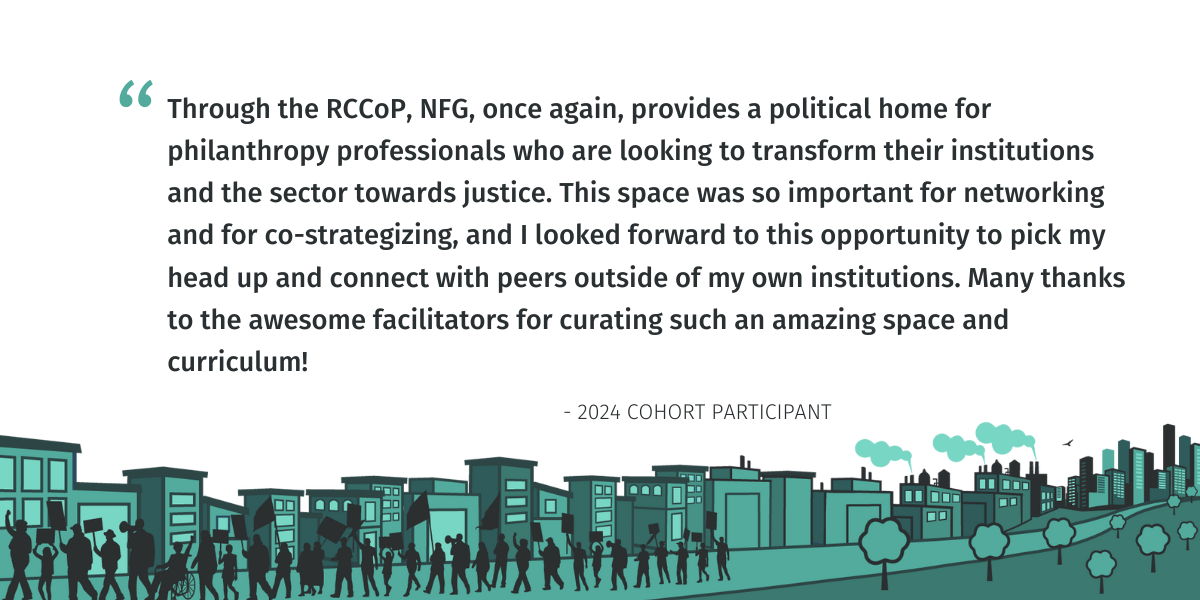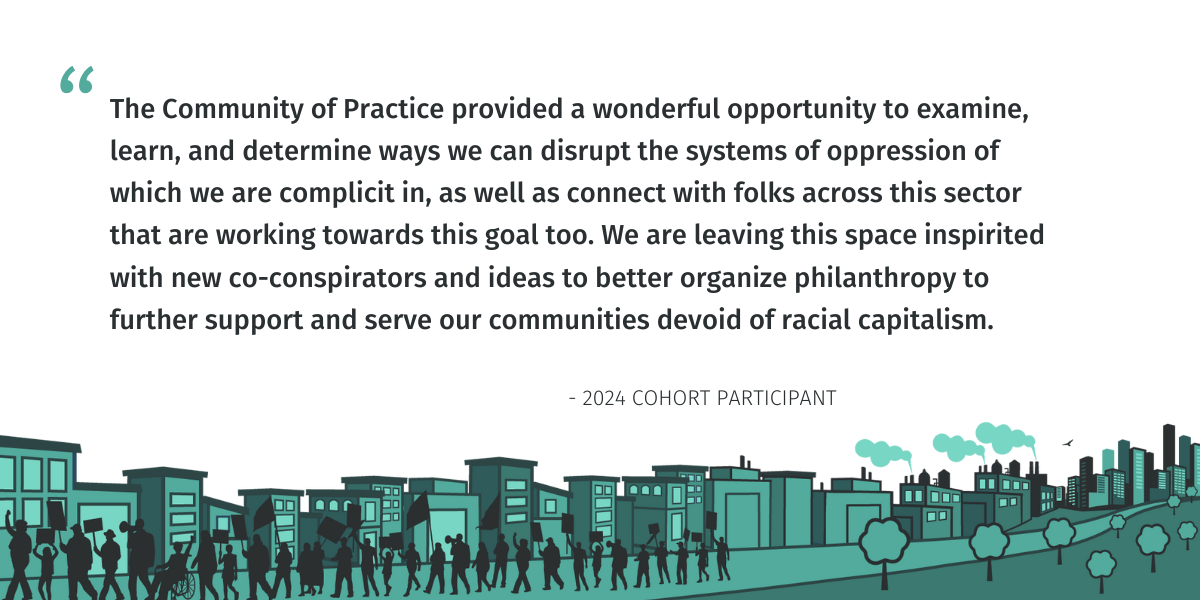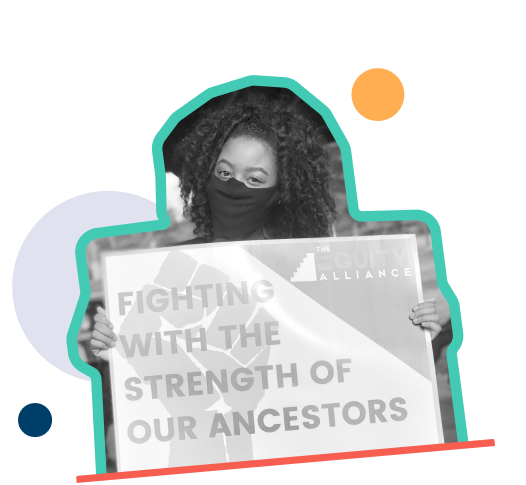NFG’s Funders for a Just Economy (FJE) program is hosting a Racial Capitalism Community of Practice (CoP) open to funder members. Through this CoP, funder participants will explore how we can deepen our grantmaking efforts to advance justice, incorporate anti-racist practices in philanthropy, and partner with movement leaders in the creation of an inclusive economy.
This will be a five part series, meeting for three hours every three weeks from March through June. Sessions will focus on political education and building shared understanding of the framework of racial capitalism, deepening relationships with one another, and cultivating a project around shifting philanthropic practices. In addition to a foundational framework of racial capitalism (and corresponding implications for philanthropy), this year’s cohort will also focus on the impact of racial capitalism on land and housing.
We ask participants to join the series in teams of three people from their institution, to support project ideation and implementation. If you have a project you have been thinking about or working on, this is an ideal space for workshopping and execution. If you are not sure yet of what a project would be but want to learn more deeply and collaborate with your colleagues, this is also the space for you.
Read on to learn more, and review the full description here.

Our Upcoming 2025 Cohort
Through the fourth cohort of the Racial Capitalism Community of Practice, we aim to put this political education and the vision of movement leaders in action. Racial Capitalism Community of Practice participants will develop their skills as funder organizers who are shifting philanthropic culture, grantmaking strategies and practices, and moving more resources toward movement efforts to build an economy that works for all.
- The target audience is funders with an interest in and commitment to increasing their awareness and practice of anti-racism in solidarity with communities of color.
- FJE encourages teams of three individuals from each institution to sign up and attend together. Past experience suggests colleagues from different teams and with different levels of positional authority participating together can lead to the greatest organizational benefits. If you think a different number of participants, such as 2 or 4 people, is better for you - please let us know.
- We ask that you commit to participating in all of the sessions (see dates below).
- Registration fee: To contribute to the costs of this program and partnership with Liberation in a Generation, FJE is requesting a $1,500-$4,500 sliding scale registration fee per foundation participating in the cohort. The levels are as follows:
- Sustain: $1,500 (This level accounts for 50% of costs, FJE is paying for the other half)
- Full Cost: $3,000 (This is the full cost of the program)
- Solidarity: $4,500 (If you support our goal to build progressive philanthropy through political education and funder-organizing training, this level will enable us to offer RCCoP next year to more folks in philanthropy who are looking for a political home)
A sliding scale is a tool towards economic justice and solidarity. Please self-determine where you'd like to be on the scale based on your institutional size and ability to support your professional development. Feel free to refer to our Membership Levels for reference. If your institution is at Level 3 or higher, we kindly ask you to consider paying the highest dollar cost which reflects the true cost of the program. If your institution is able to give more, we appreciate and welcome the support which will enable us to consistently offer RCCoP to the NFG network.
All sessions will be held virtually via Zoom for three hours every three weeks March through June 2025. Session dates are:
- Wednesday, March 12th, 10am to 1pm PT
- Wednesday, April 2nd, 10am to 1pm PT
- Wednesday, April 23rd, 10am to 1pm PT
- Wednesday, May 14th, 10am to 1pm PT
- Wednesday, June 4th, 10am to 1pm PT

See further details and full description about our 2025 Community of Practice. Applications launch January 7th, and close February 14th. Please email Neda Said, Senior Program Manager, at neda@nfg.org with any questions.
What is Racial Capitalism?
The term racial capitalism is a concept originally proposed by Cedric J. Robinson to describe the extractive way America’s capitalist economy derives social and economic value from another person of a different racial identity. The basic tenets of racial capitalism are:
- Capitalism is defined as an economic and political system in which a country’s trade and industry is controlled and owned by private individuals and corporations for profit;
- Capitalism measures success based on a company’s ability to continually generate and increase their rate of profitability, constantly extracting maximum value for owners;
- To sustain and increase the rate of capital growth and extract maximum value/profit for owners, capitalism must establish and exploit the idea of unequal human value to reduce costs; and
- The predominant differentiator of human value in many countries, including the United States, was and is race and ethnicity.
Additionally, read more about participant learning and reflections from our first Racial Capitalism Community of Practice.
Event Details
When
Mar 12, 2025 - Jun 4, 2025
10:00 am - 1:00 pm PT
Where
Virtual
Posted 08/18/2021 in
